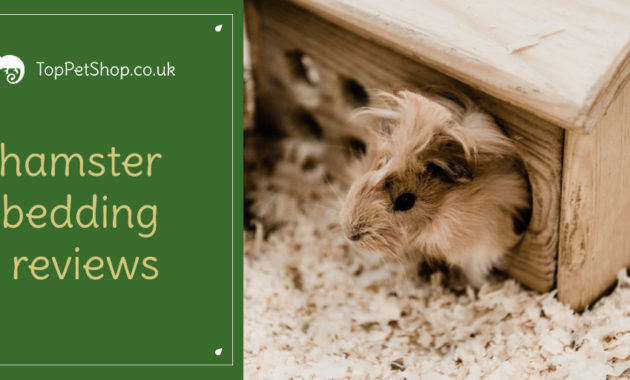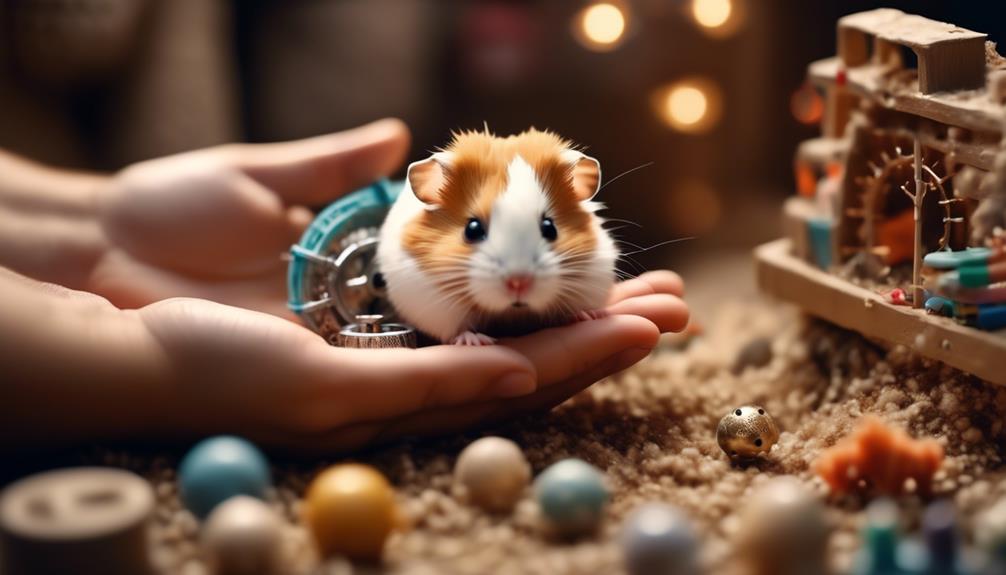
When it comes to the world of small pets, Syrian hamsters hold a treasure trove of secrets waiting to be discovered. These adorable creatures may seem like low-maintenance companions, but beneath their fluffy exteriors lies a complex world of needs and behaviors.
From understanding their unique personalities to providing them with the right environment and nutrition, there is much to learn about caring for these beloved pets.
So, why not embark on a journey of exploration and uncover the hidden gems of Syrian hamster care? You’ll be amazed at what you find and how it can enrich your bond with these delightful creatures.
Key Takeaways
- Syrian hamsters should be kept alone as they are territorial animals.
- Regular handling and interaction with their owners is important for bonding and training.
- Providing a spacious cage with the necessary accessories, such as an exercise wheel and hiding spot, is essential for their well-being.
- Regular health checks and attention to their dental health are important for maintaining their overall well-being.
Basic Information and Care
Caring for Syrian hamsters involves providing them with proper attention, a suitable environment, and regular interaction with their owners. Syrian hamsters are territorial mammals and should be kept alone. They’re nocturnal and most active at night. With an average lifespan of 1 to 2 years, Syrian hamsters can be very active and have individual personalities. They require daily attention and care from their owners.
It’s important to wash hands before handling to avoid being nibbled and to give them a few minutes to wake up before attempting to handle them. Always be gentle when picking them up and avoid touching their nose and whiskers. Start with short handling sessions to build their confidence, and allow them to settle in for 24 hours before handling.
Playing with them often and providing supervised exercise opportunities, such as using a play ball or a hamster-safe area, is crucial. Cleaning the cage thoroughly at least once a week with pet-safe disinfectant is necessary. It’s also important to avoid feeding lettuce or avocado to hamsters and provide fresh fruits and vegetables in moderation.
Syrian hamsters need a spacious cage with platforms, ladders, and tubes for extra space and stimulation. An exercise wheel is essential for their physical activity, and a house or hiding spot should be provided for them to feel secure. Prioritizing space for exercise over overcrowding the cage with toys is recommended.
Handling and Bonding
Handling and bonding with Syrian hamsters requires regular interaction and patience from their owners. By spending time with their hamsters on a daily basis, owners can build a strong bond with these furry companions.
It’s important to handle them gently and avoid touching their sensitive nose and whiskers. Starting with short handling sessions and gradually increasing the duration can help build their confidence.
Owners should allow their hamsters to settle in for 24 hours before handling them, as this gives them time to adjust to their new environment.
Regular playtime and gentle interaction will help Syrian hamsters feel loved and cared for, leading to a stronger bond between them and their owners.
Housing and Environment
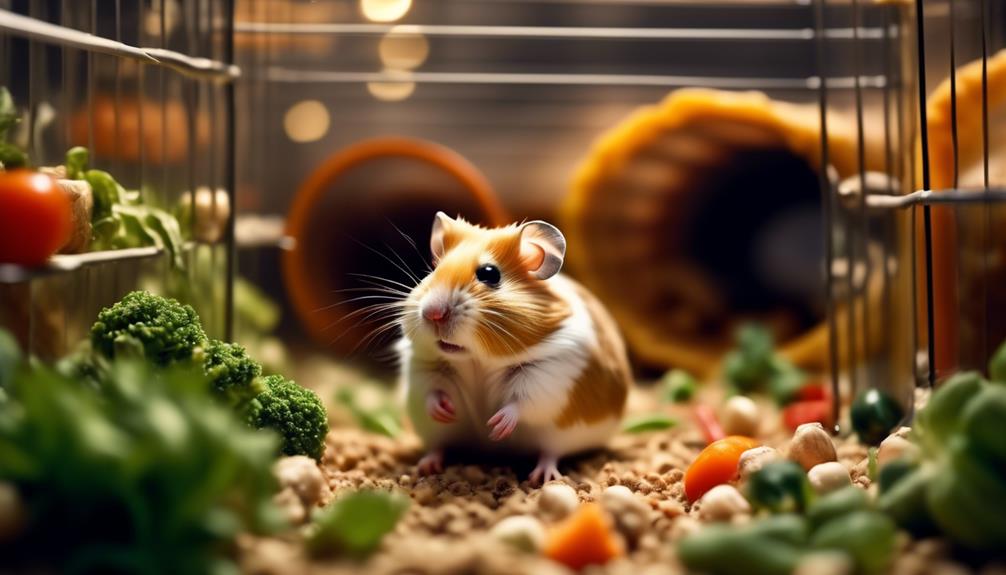
When it comes to creating a suitable habitat for Syrian hamsters, providing the right housing and environment is crucial. To ensure the well-being of these furry creatures, here are some key considerations:
- A spacious cage with platforms, ladders, and tubes provides extra space and stimulation for the hamster.
- An exercise wheel is essential for their physical activity, so choose a size that allows them to run without curving their back.
- Providing a house or hiding spot in the cage allows the hamster to feel secure and have a cozy place for sleeping.
Water, Food, and Treats
Providing proper hydration and nutrition is essential for the health and well-being of Syrian hamsters.
When it comes to water, it’s important to make sure that the water bottle spout is reachable for the hamsters and to refill it daily to monitor their drinking. Regularly cleaning the water bottle is also necessary to prevent blockages.
As for food, Syrian hamsters benefit from scatter feeding, which means spreading their food around the cage rather than using a food bowl. However, if a food bowl is used, it’s recommended to use stainless steel or ceramic bowls that are hygienic and chew-proof.
It’s also important to provide wood gnaws to help keep their teeth trimmed and in good condition. While treats can be given occasionally, it’s important not to overdo it, as their complete food mix already provides necessary nutrients.
Health Care
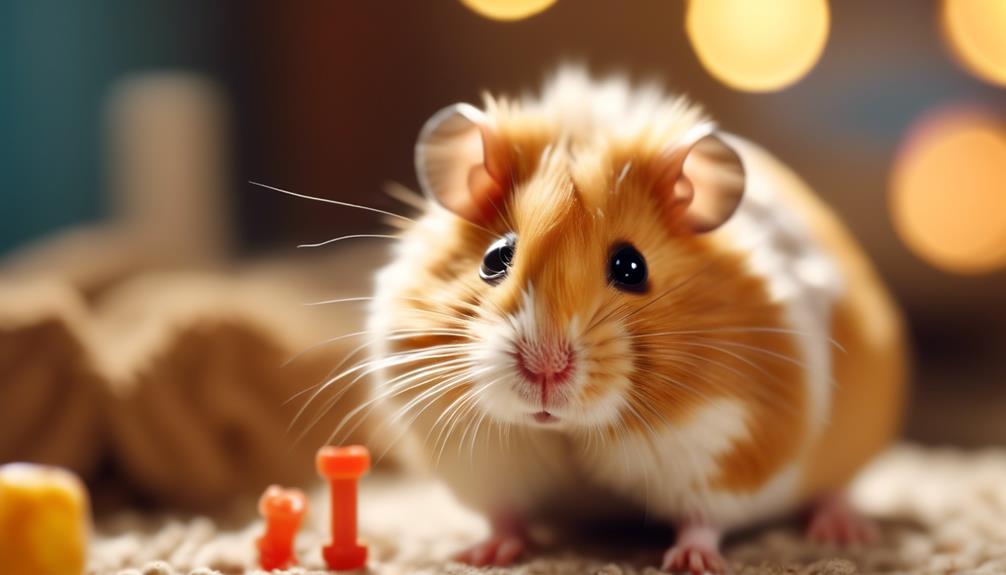
Regular health check-ups are essential for ensuring the well-being of Syrian hamsters. These small creatures are prone to certain health issues that can be detected and treated early with regular examinations. Here are three important aspects of health care for Syrian hamsters:
- Dental health: Hamsters’ teeth continuously grow, and if left unchecked, they can become overgrown and cause discomfort or even injury. Regular dental check-ups can help prevent this problem.
- Temperature regulation: Syrian hamsters aren’t able to hibernate like some other species. If the temperature drops below 5 ̊C or 40 ̊F, they can go into a state of false hibernation. Monitoring the temperature in their environment is crucial to prevent this.
- Overall well-being: Regular health check-ups allow for a thorough assessment of the hamster’s overall health, including the condition of the tail, nails, teeth, fur, and skin. It also helps identify any potential health concerns such as respiratory issues or bloating.
Cage Setup and Accessories
To ensure a safe and stimulating environment for Syrian hamsters, setting up the cage with appropriate accessories is essential.
Syrian hamsters need a spacious cage with platforms, ladders, and tubes for extra space and stimulation.
An exercise wheel is essential for their physical activity, but it’s important to choose a wheel size that allows the hamster to run without curving their back.
Providing a house or hiding spot for the hamster to feel secure is also important.
It’s crucial to avoid overcrowding the cage with toys and prioritize space for exercise.
Training and Enrichment
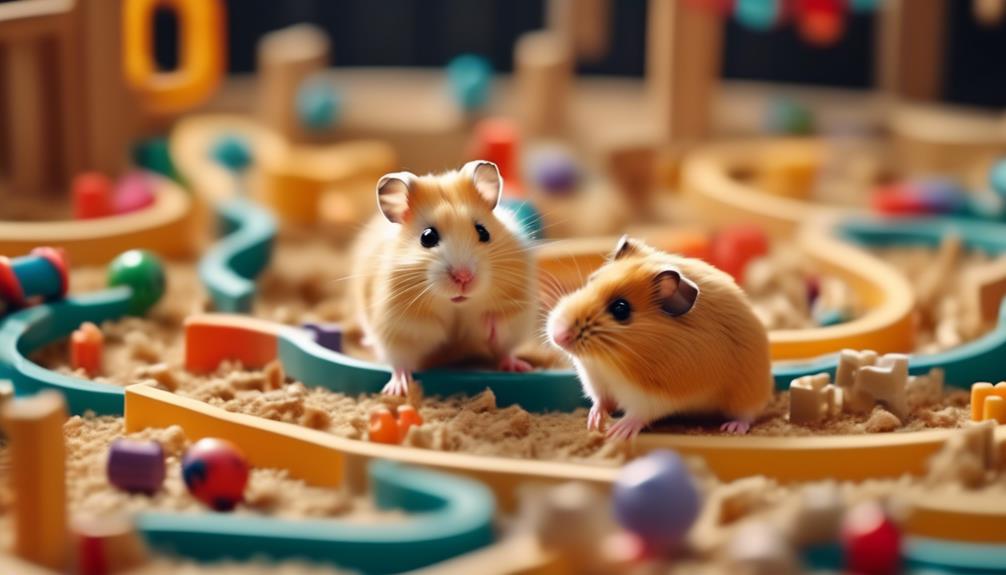
Hamster owners can enhance their pet’s well-being by incorporating training and enrichment activities into their daily routine. By providing mental and physical stimulation, hamsters can lead happier and healthier lives.
Here are three ways to train and enrich Syrian hamsters:
- Teach them tricks: Syrian hamsters are intelligent creatures that can be trained to recognize their name and perform simple tricks. With patience and consistent training, they can learn to respond to commands and engage in interactive play.
- Bond through handling: Regular handling helps build a strong bond between hamsters and their owners. By gradually desensitizing them to handling and providing positive experiences, hamsters can become comfortable and enjoy being handled daily.
- Provide attention and interaction: Syrian hamsters thrive on attention and interaction. Spending quality time with them, talking to them, and offering treats as rewards will strengthen the bond and keep them mentally stimulated.
Training and enrichment activities aren’t only beneficial for the hamsters’ well-being but also provide a rewarding experience for the owners.
Exercise and Physical Activity
Incorporating regular exercise and physical activity is crucial for maintaining the well-being and overall health of Syrian hamsters. These small mammals are naturally active and need opportunities to burn off energy and stimulate their minds.
One essential item for their physical activity is an exercise wheel. It’s important to choose a wheel size that allows the hamster to run without curving their back, as this can lead to injuries.
In addition to the wheel, providing supervised exercise opportunities outside of the cage is also beneficial. This can be done by using a hamster play ball or creating a hamster-safe area where they can explore and engage in physical activities.
Choosing the Right Hamster Wheel
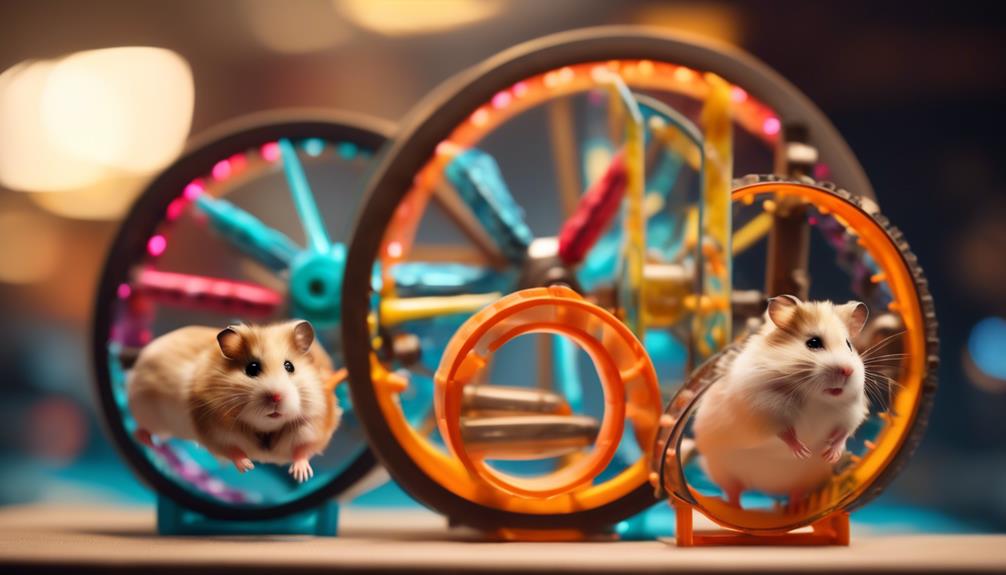
When selecting a hamster wheel, it’s important to choose a size that allows the Syrian hamster to run comfortably without curving its back. Syrian hamsters are known for their love of exercise, and a wheel is essential for their physical activity.
To ensure you choose the right hamster wheel, consider the following:
- Size: Opt for a wheel with a diameter of at least 8 inches to accommodate the hamster’s body size.
- Solid Surface: Look for a wheel with a solid running surface to prevent potential injury to their feet or tail.
- Noise Level: Select a wheel that operates quietly to minimize disturbances, especially if the hamster’s cage is located in a bedroom or living area.
Signs of a Healthy Hamster
One can determine the health of a Syrian hamster by observing its physical appearance and behavior. A healthy hamster will have bright, clear eyes and a clean, shiny coat. Its fur should be soft and free from any mats or bald patches. The hamster should also have a good appetite and be active and alert. It should move around its cage with ease and show interest in its surroundings.
Additionally, a healthy hamster will have clean ears, teeth, and paws. It should have regular bowel movements and show no signs of distress or discomfort. Any changes in a hamster’s appearance or behavior should be monitored closely, and if there are concerns, it’s recommended to consult a veterinarian.
Frequently Asked Questions
How Can I Train My Syrian Hamster to Use a Litter Box?
To train a Syrian hamster to use a litter box, place a small amount of their soiled bedding in the box. Place the box in a corner of the cage and reinforce positive behavior with treats and praise. Be patient and consistent in the training process.
What Are Some Common Health Issues That Syrian Hamsters May Experience?
Some common health issues Syrian hamsters may experience include overgrown teeth and false hibernation. Regular health checks are important to identify any concerns, such as cleanliness and condition of various body parts.
Can Syrian Hamsters Be Kept in Pairs or Groups?
Syrian hamsters should be kept alone as they are territorial mammals. They prefer to live in solitude and can become aggressive if housed with others. Keeping them individually ensures their well-being and reduces the risk of conflicts.
How Often Should I Take My Syrian Hamster to the Veterinarian for Check-Ups?
Syrian hamsters should be taken to the veterinarian for regular check-ups at least once a year. Regular health checks are important to ensure their overall well-being and to address any potential health concerns.
Are There Any Specific Toys or Activities That Syrian Hamsters Particularly Enjoy?
Syrian hamsters particularly enjoy toys and activities that provide mental and physical stimulation. Some popular options include exercise wheels, tunnels, chew toys, and puzzle feeders. It’s important to provide a variety of toys to keep them entertained.
What Are the Key Differences in Caring for a Roborovski Hamster Compared to a Syrian Hamster?
Caring for a Roborovski hamster requires a deep understanding of their unique dietary and exercise needs. Unlike Syrian hamsters, these tiny creatures have incredibly high energy levels and need ample space to run and play. A fascinating roborovski hamster discovery is their ability to run up to 100 miles in a single night!
Conclusion
In conclusion, caring for Syrian hamsters requires knowledge and understanding of their behavior, needs, and proper care.
This comprehensive guide has provided hamster owners with valuable information on handling and bonding, housing and environment, nutrition, health care, training, enrichment, and exercise.
By following these guidelines and being attentive to their hamster’s needs, owners can ensure a happy and healthy life for their adorable furry friends.

